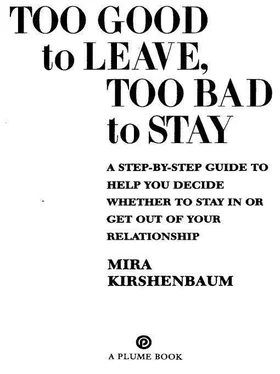Kirshenbaum, Mira - Too Good to Leave, Too Bad to Stay
Здесь есть возможность читать онлайн «Kirshenbaum, Mira - Too Good to Leave, Too Bad to Stay» весь текст электронной книги совершенно бесплатно (целиком полную версию без сокращений). В некоторых случаях можно слушать аудио, скачать через торрент в формате fb2 и присутствует краткое содержание. Жанр: Психология. Описание произведения, (предисловие) а так же отзывы посетителей доступны на портале библиотеки ЛибКат.
- Название:Too Good to Leave, Too Bad to Stay
- Автор:
- Жанр:
- Год:неизвестен
- ISBN:нет данных
- Рейтинг книги:3 / 5. Голосов: 1
-
Избранное:Добавить в избранное
- Отзывы:
-
Ваша оценка:
- 60
- 1
- 2
- 3
- 4
- 5
Too Good to Leave, Too Bad to Stay: краткое содержание, описание и аннотация
Предлагаем к чтению аннотацию, описание, краткое содержание или предисловие (зависит от того, что написал сам автор книги «Too Good to Leave, Too Bad to Stay»). Если вы не нашли необходимую информацию о книге — напишите в комментариях, мы постараемся отыскать её.
Too Good to Leave, Too Bad to Stay — читать онлайн бесплатно полную книгу (весь текст) целиком
Ниже представлен текст книги, разбитый по страницам. Система сохранения места последней прочитанной страницы, позволяет с удобством читать онлайн бесплатно книгу «Too Good to Leave, Too Bad to Stay», без необходимости каждый раз заново искать на чём Вы остановились. Поставьте закладку, и сможете в любой момент перейти на страницу, на которой закончили чтение.
Интервал:
Закладка:
The scales seemed to fall from Vinnie’s eyes. He acted genuinely sorry. “You tell me every time I do something to be too powerful,” Vinnie offered, “and I’ll try not to do that, okay?”
Rosemary hoped she’d finally gotten through. Still in the safety of therapy she said, “All right—when we leave here I’ve got to go right home so I have time to change ’cause I’ve got to get dressed up for a meeting with a new client. Is that going to be a problem for you?” It was fine with Vinnie.
But later I learned that in the car, driving home, Vinnie had started insisting they quickly swing by the restaurant to see how things were going there. “Besides,” Vinnie said, “you don’t need to change.” Rosemary suddenly had this horrible sense that he knew exactly what he was doing, that he didn’t really need to go to the restaurant at all, that for him if they drove right home Rosemary would “win” and that Vinnie was an automaton programmed to not let that happen.
Hidden Power
But do you leave a relationship just because your partner “modifies” an agreement? Rosemary had been asking herself questions like that for a very long time. There’s something about power—like the wind—that makes it invisible in relationships even when it’s blowing us away.
We’ve got to understand what keeps power so hidden before we can truly see it. There are a couple of reasons why the ebb and flow of power is a dirty little secret in relationships, why we keep it secret from each other and from ourselves.
Power v8. Love. First, power seems completely antithetical to the idea of love. We feel that power no more belongs in the love context than sex belongs in the church context. If two people are getting close and little red hearts are floating up in the air like bubbles from a bubble pipe, how can the thought of power, much less the reality of power, intrude?
No wonder we’re blind to power in the realm of love. It’s a terrifying thought: “If I even think it’s about power, that means love is dead, and I won’t face that.” Yes, we reserve the right to complain endlessly about our partners, to even call them controlling, but if this relationship is about power, we think, it can’t be about love.
But in the world of how things really are, as opposed to the world of how things are supposed to be, there is all too often something going on with power in our relationships that fills them so full of frustration and confusion that all we can think of is getting out.
Power and Shame. The other reason power is rarely talked about is shame. Imagine how a smart, competent, educated woman like Rosemary felt admitting she couldn’t hold her own in the face of Vinnie’s power. Outside of coping with a newborn baby or a teenager or a boss, we’re all embarrassed to admit we feel powerless. Besides, to do so would mean we’re saying we want power ourselves, which is embarrassing. But even more, it would mean we’re saying we’re weak, which is humiliating.
And so men certainly don’t talk about how their wives make them feel powerless. And women today are just as reluctant to seem like helpless victims.
Unfortunately, women also get hit from the other side. While we’re ashamed of being powerless, we’re ashamed of being powerful too, of wanting power, of caring about power. The image of women in our society these days is that women somehow have a special aptitude for cooperation and connection. This translates for the average woman as saying that if she cares about power and uses her personal power, she’s not a normal woman. So if there’s shame both from being powerless and from being powerful, the only psychological strategy that’s possible is to try to put all thought of power out of your mind.
And, when it comes to dealing with a relationship made iffy by power problems, this means a lot of women have trouble figuring out what’s really going on and what they really want in the relationship.
But there’s good news. When you look power in the eye, you can’t lose. Either there’s something toxic going on with power in your relationship that makes it a relationship you’ll be happy leaving, or the realities of power in your relationship don’t make it too bad to stay in, and you’ll very likely find that power problems are fixable.
STEP #7: POWER PEOPLE
How in the world does power intrude on our love nests? Simple. It’s up for grabs. The only way you could have a relationship without power struggles would be like the famous scene in the fifties movie Marty, where Marty and his buddy sit around saying:
“What do you want to do?”
“I don’t know. What do you want to do?”
“I don’t know. What do you want to do?”
“I don’t know. What do ... ?”
You get the picture.
The point is that from the day you and your partner meet, you have to decide to do things and you have to decide to do them in a certain way. Every single decision is fertile soil for a power struggle, because with every single decision there’s a question of who’s going to make it and whose needs are going to prevail.
So there are power issues involved with deciding where you’re going to go on your first date, when you make love, what you do when you make love, who’s allowed to shout and under what circumstances, where you’re going to go on your vacation, how much money you’re going to save, how long the baby’s allowed to cry before you’re either torturing him or spoiling him, how late you’re allowed to come home from work without getting in trouble for not calling.... Everything is a potential source of power struggles.
No wonder people fight in even the healthiest of relationships: there’s a rough balance of power and they’re just struggling to have their say. If you watch the average couple deal with this, you see that sometimes they work out who decides what by letting each partner be in charge of certain things: you’re in charge of paying the bills, your partner’s in charge of initiating lovemaking.
Sometimes couples work this out on the basis of need: whoever cares the most about something makes the decision.
Sometimes couples work this out through some rough sense of balance: because you decided what to watch on TV Thursday night, your partner gets to decide what to watch on Sunday night.
Sometimes couples work this out on the basis of knowledge or skill: whoever’s best at something makes decisions about it.
Most people work out their power issues through a mixture of these and other fair methods, including a fight that’s often just a way of bringing out all the issues and showing who cares how much about what.
But some people can’t. They’re what I call power people, and they consistently make relationships too bad to stay in.
Power people are different from everyone else. If you’re in a relationship with the average person, then the two of you struggle as everyone else does over whose needs will get met. But if you’re in a relationship with a power person, then any and all of your needs are a threat to his power. You’re not two people with ordinary needs; one of you has an inordinate need for power in and of itself.
Here’s the question that gets at this:
Diagnostic question #7. Does your partner bombard you with difficulties when you try to get even the littlest thing you want; and is it your experience that almost any need you have gets obliterated; and if you ever do get what you want, is getting it such an ordeal that you don’t feel it was worth all the effort?
There’s a lot to think about here. You’ve got to be careful with this question. It’s so easy for people in iffy relationships to get annoyed with their partners that they might confuse someone who’s very strong with a real power person. Let’s make the difference clear in the following Perspectives.
Читать дальшеИнтервал:
Закладка:
Похожие книги на «Too Good to Leave, Too Bad to Stay»
Представляем Вашему вниманию похожие книги на «Too Good to Leave, Too Bad to Stay» списком для выбора. Мы отобрали схожую по названию и смыслу литературу в надежде предоставить читателям больше вариантов отыскать новые, интересные, ещё непрочитанные произведения.
Обсуждение, отзывы о книге «Too Good to Leave, Too Bad to Stay» и просто собственные мнения читателей. Оставьте ваши комментарии, напишите, что Вы думаете о произведении, его смысле или главных героях. Укажите что конкретно понравилось, а что нет, и почему Вы так считаете.












